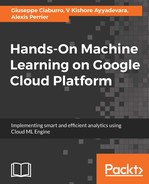So, near-instant availability, low cost, flexible architecture, and near-unlimited resources are the advantages of cloud computing, at the expense of extra overhead and recurring costs.
In the global landscape of cloud computing, the GCP is a public unmanaged IaaS cloud offering, with some PaaS and SaaS services. Although Azure and GCP are directly comparable for standard cloud services such as from computing (EC2, Cloud Compute, and so on), databases (BigQuery, Redshift, and so on), network, and so forth; the Google Cloud approach to ML is quite different than Amazon's or Azure's.
In short, AWS offers, either all-in-one services for very specific applications—face recognition and Alexa-related applications, or a predictive analytics platform based on classic (not deep learning) models called Amazon ML. Microsoft's offer is more PaaS centered, with its Cortana Intelligence Suite. Microsoft's ML service is quite similar to AWS's, with more available models.
The GCP ML offer is based on TensorFlow, Google's deep learning library. Google offers a wide range of ML APIs based on pre-trained TensorFlow models for NLP, speech-to-text, translation, image, and video processing. It also offers a platform where you can train your own TensorFlow models and evaluate them (TensorBoard).
